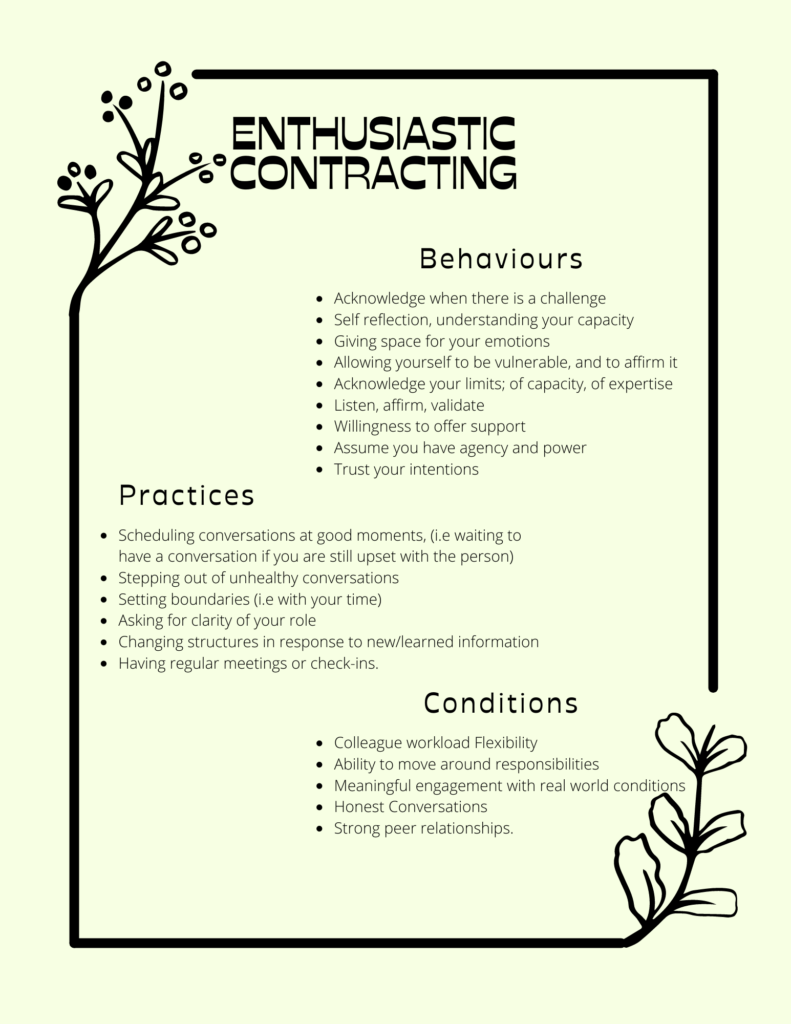Contracts as Dialogue, as Conversation. Contracting as Maybe, Possibly, Ethical.
I was once told that a contract is meant to be a conversation, and hopefully, a dialogue. Yet it is rarely treated as such.
In reality, a contract often brings up feelings of fear. Perhaps these anxieties regarding contracts come from a worry that one may misunderstand the legal jargon, or maybe it comes from an understanding of a history of manipulation and deception. Contracts as we know it, and as we use in Canada, are rooted in ideas of ownership, responsibility, and respectability. If we are to contract in an ethical manner, in a means for which both parties are in true and proper agreement, what is the best way forward?
No idea.
Presented at this year’s Festival of Live and Digital Art, Enthusiastic Contracting was a workshop led by artist, equity worker, and community organizer Nikki Shaffeeullah along with producer and administrator Rachel Penny. The two have a longstanding relationship as artists, and administrators, most notably with the AMY Project. Last year, as part of Undercurrent Theatre’s program Parallel Tracks, the two curated a panel called Contracting in Unprecedented Times, which was presented as part of FOLDA 2021. Undercurrent will soon be releasing a publication about this event and other learnings from Parallel Tracks.
Penny and Shaffeeullah do a fantastic job of facilitating a space where participants are collectively informing the learning process. Penny and Shaffeeullah started with a beautiful land acknowledgment informing participants their positionality, while tying it into the workshop. I believe that with land acknowledgements, we are past simply stating that we live on stolen lands. Exploring the harmful colonial history of contracts/agreements in Canada reminded me just how vast an agreement can be.
After unpacking our colonial impact, we then went into a group exercise that gave way for play. This introduction enabled us to seamlessly transition into a more personal and intentional reflection throughout the workshop. The idea of contracting in the workshop was focused more on the ideas of an agreement, and responsibility. Based in conversation and exploration, Shaffeeullah and Penny were able to offer a creative means to explore what ‘good’ contracting can look and feel like.
Good, as always, is subjective. What worked for one person may not work for another, and may not apply in each situation. We came up with a list that outlined tactics we collectively felt worked for our situations, and things that we think could have made situations better if they had been implemented.

Everything henceforth is my takeaways and understanding of what was discussed within the workshop.
There is no copy-paste answer once we start to question the flawed systems we exist in. As a group, we spoke about different situations that we have been through and how we were able to overcome them. The list of behaviors breaks down as something that a specific person is able to do, whereas the practices and conditions are often greater than the individual. For a contract or agreement to be a conversation that onus cannot be put on a single party. A person’s behaviors can lead them to a change they would like to see, but if institutions and companies do not have the right practices and conditions in place, the individual may not feel empowered to take action.
When we think about good ways to contract and establish open conversation, there needs to be space for change. If contractually, we are sharing resources, and giving one another services or goods in exchange, this needs to be clearly communicated. There needs to be space for continuous conversation before, after, and during the ‘contracted’ work. There are fair rebuttals to my claims, maybe regarding resources, or simply institutional barriers that make work like this difficult.
None of these are answers, only suggestions. But within these are ways for us to build authentic relationships between artists and organizations.
And if that doesn’t work, well, we try again.
